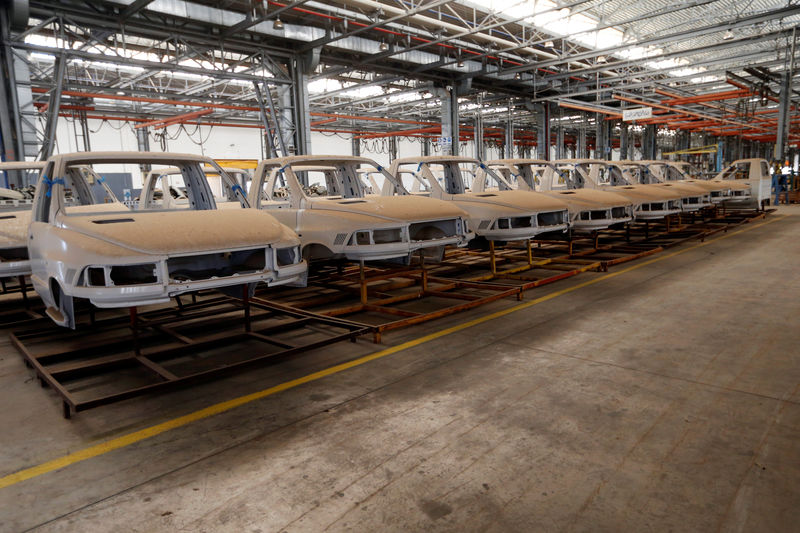 © Reuters. A general a view of Libya’s truck factory in Tripoli
© Reuters. A general a view of Libya’s truck factory in TripoliTRIPOLI (Reuters) – In the vast assembly hall of Libya’s Trucks and Buses Company (TBCo) the country’s sole automobile manufacturer, two men work on the body of a new bus and a few others inspect a row of truck cabs.
Shuttered for five years following 2011’s NATO-backed uprising, the factory’s reopening in May 2017, with the encouragement of the UN-backed government of national accord (GNA), was a sign of hope.
But while it once turned out 5,000 vehicles a year, it now completes only 8 a month with demand mostly coming from Libyan state institutions. Its struggles are symptomatic of the crises facing Libya’s non-oil industry.
The plant, established in 1976 as a joint venture between the Libyan state and Italy’s Iveco, which holds a 25 percent stake, must import engines and auto parts. The government’s devaluation of Libya’s dinar to 3.9 per dollar from 1.3 last September to curb black market exchange operations has driven up costs, impeding demand and production.
“A medium Iveco bus used to cost 33,000 Libyan dinar ($23,633). With the new rate of 3.90 Libyan dinar to the dollar, the price skyrocketed to about 125,000 dinar,” said TBCo manager Hisham al-Hadi Abughlayla.
TBCo management is due to meet the newly-appointed minister of economy Ali Eswai in a bid to negotiate “the exclusion of the company from the new exchange rate,” he said.
If bank credit was available at an appropriate price, the company could produce as before, but otherwise it will be difficult, Abughlayla added.
The plant stretches over 66 hectares in Tripoli’s suburbs.
Before 2011 it employed 1,000 people, now it employs only 300, the workers dwarfed by their surroundings and the towering machinery.
The Chairman of Libya Businessmen Council Abdalla Fellah said Libya’s industry and private sector is stymied by a lack of diversity and lack of competitiveness, not only as a result of the chaos which ensued after the toppling of long-ruling dictator Muammar Gaddafi, but also due to Libya’s decades as a state-dominated economy.
Gaddafi “seized all economic activities without allowing businessmen to develop the sector,” he said.
Boosting the private sector hinges on adopting investment friendly regulation and boosting security, Fellah added.
Fusion Media or anyone involved with Fusion Media will not accept any liability for loss or damage as a result of reliance on the information including data, quotes, charts and buy/sell signals contained within this website. Please be fully informed regarding the risks and costs associated with trading the financial markets, it is one of the riskiest investment forms possible.
Source: Investing.com





























